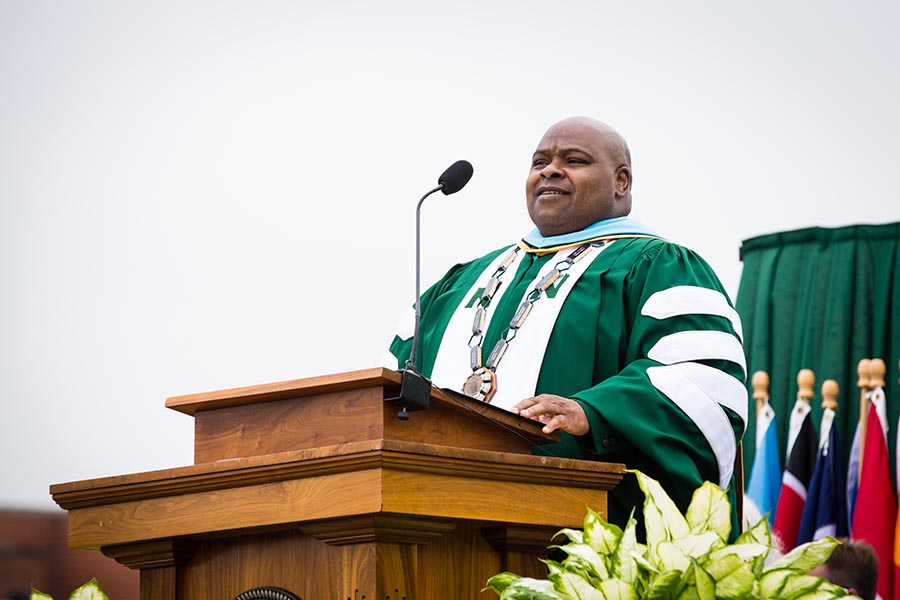May 6, 2023
Northwest Missouri State University honored a record number of graduating students during a commencement ceremony Saturday morning at Bearcat Stadium, celebrating a culminating chapter in the students’ lives and a beginning of what the University anticipates they will accomplish in subsequent years.
The ceremony recognized 1,683 students, ranging in age from 19 to 85, who completed degrees during the spring semester, which ended Friday, or plan to finish degrees this summer. The conferrals totaled 766 undergraduate degrees and 917 graduate degrees, consisting of 730 master’s degrees and 187 education specialist degrees.
A capacity crowd attended Northwest’s commencement ceremony at Bearcat Stadium. (Photos by Lauren Adams/Northwest Missouri State University)

A degree candidate waves to attendees in the grandstand at Bearcat Stadium during Saturday’s commencement ceremony.

Northwest Interim President Dr. Clarence Green addressed degree candidates and their families.

Northwest leaders conferred degrees to four undergraduate candidates as well as two graduate candidates on Thursday evening for the student-athletes who could not participate in Saturday’s ceremony,
Although Northwest offered a singular commencement ceremony at Bearcat Stadium during the COVID-19 pandemic in the summer of 2020 in lieu of its traditional spring and winter commencement ceremonies that year, Saturday’s celebration was the first full-scale commencement ceremony at that venue after decades of the University hosting multiple commencement weekend ceremonies inside Bearcat Arena.
A capacity crowd filling the stadium cheered the degree candidates as their names were called and they crossed a stage at the stadium’s south end zone.
“Every day is a great day to be a Bearcat, and I know our degree candidates will fondly remember this day in particular – the day in which we honor the completion of your degree, your perseverance and success at achieving something so few accomplish,” Northwest Interim President Dr. Clarence Green said during his opening remarks. “Not only have you completed your degree, you were in the thick of it during a global pandemic, unprecedented division in our county and the creation of TikTok.”
Green emphasized what it means to be a Bearcat at Northwest, highlighting the University’s tenets of learning, connecting, caring, practicing civility and showing pride. Noting about one-third of the U.S. population holds a bachelor’s degree or higher, Green said Northwest graduates prove themselves as lifelong learners. Further, he encouraged the graduates to engage with the communities where they choose to live, be solution-oriented and serve others in meaningful ways.
“Whether you are receiving an undergraduate or graduate degree, Bearcats go into the workforce and their communities with the mission of bettering the places that they work and live,” Green said. “Bearcats also lean on each other and seek help when needed.”
Northwest’s most common undergraduate degree this spring is the Bachelor of Science in elementary education, and the most common graduate degree is the Master of Science in educational leadership with a K-12 emphasis.
Geographically, the graduates represented 38 states and 18 countries. While 68 percent of the graduates hailed from Missouri, another 11 percent were from Iowa, 7 percent were from Nebraska and 4 percent came from Kansas.
In addition to Saturday’s ceremony, Northwest leaders honored six student-athletes on Thursday evening who completed degrees but were competing this weekend with the Bearcat track and field team at the 2023 MIAA Outdoor Track and Field Championships in Jefferson City, Missouri.

A graduating student celebrates the conferral of her degree as she crosses Northwest’s commencement stage.
About Northwest Missouri State University
With an enrollment of about 8,500 students, Northwest is a coeducational, primarily residential four-year university that offers a broad range of undergraduate and selected graduate programs on its Maryville campus as well as its Northwest-Kansas City location and through Northwest Online.
Founded in 1905, Northwest boasts a high retention rate, and results of 2021 Ruffalo Noel Levitz Student Satisfaction Inventory show Northwest students are more satisfied than students at national peers and 80 percent of Northwest students report they would repeat their University experience, compared to 77 percent of students surveyed nationally at their respective institutions. Additionally, Northwest’s graduation rate is in the 95th percentile among its peers.
Furthermore, 98 percent of Northwest bachelor’s degree earners and nearly 100 percent of master’s degree earners secure employment or continue their education within six months of graduation, according to the most recent data.
Northwest places a high emphasis on profession-based learning to help graduates get a jumpstart on their careers. Students have opportunities to build their résumés with experiences on campus in nearly every area of study, including the Horace Mann Laboratory School, National Public Radio affiliate KXCV, the R.T. Wright Farm, Mozingo Outdoor Education Recreation Area or Knacktive, a student-driven integrated digital marketing communications agency. In conjunction with its emergency and disaster management program, Northwest organizes and hosts Missouri Hope, an annual mass casualty training exercise that attracts first responders and emergency workers from throughout the nation and provides hands-on training in preparation for a natural disaster.
Furthermore, its vibrant and diverse learning community offers more than 150 student organizations, and textbooks and a laptop are included in tuition, which is among the lowest in the nation, saving students an estimated $6,800 over four years. Northwest also offers 1,200 student employment positions, allowing students to build professional skills through its internationally benchmarked student employment program.
For more information about Northwest and its performance, visit www.nwmissouri.edu/aboutus/facts/.
